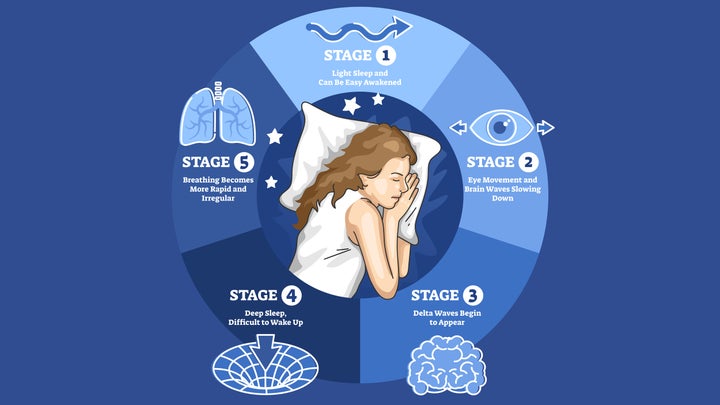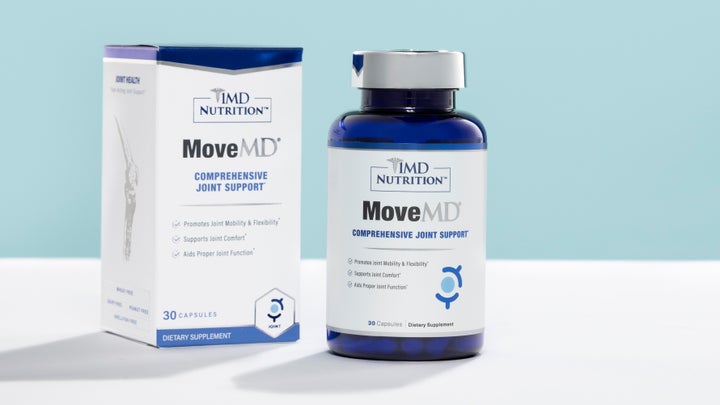Do Your Joints a Favor, Get More Sleep
Sleep, especially deep sleep, has a direct correlation to our overall wellness, and that includes joint health. Here’s how it supports your joints.
5 minute read
Last Updated December 19, 2022
Sleep, especially deep sleep, has a direct correlation to our overall wellness, and that includes joint health. Here’s how it supports your joints.
5 minute read
Last Updated December 19, 2022

Sleep directly correlates to our overall wellness, including the support of joint health. Everyday discomfort in our joints can disrupt our sleep, and at the same time, restorative sleep patterns can help maintain our joint health. We are now beginning to uncover the multidirectional role sleep helps in maintaining our mobility.
Sleep stages 1 and 2 consist of light sleep, while stages 3 and 4 are notable deep sleep stages. REM is the 5th and deepest phase of sleep.
During stage 1, you drift from awake to light sleep for 10 minutes or so. In stage 2 of the sleep cycle, your breathing, heartbeat, and brain wave activity begin to slow, your body temperature decreases, and your muscles begin to relax. This muscle relaxation is essential for the healthy increase in blood flow to your tissues, which brings fresh oxygen and nutrients needed for proper cellular function in the following phases.
In stage 3, you enter deep sleep and remain in it through stage 4. During deep sleep, your breathing, heartbeat, and brain waves reach their lowest levels. Deep sleep is known as the restorative stage because tissues are supported with key hormones that are released throughout the body. Steady hormone production promotes optimal body metabolism, healthy bone density and mass, and healthy joint physiology.
During the 5th and final stage of sleep, known as REM sleep, our eyes rapidly move while closed, brain waves become active, and breathing and heart rates increase. REM sleep is when you are most likely to dream, and productive REM sleep is linked to a healthy mood and supports the body's ability to manage everyday stress.
About 80% of our nights' rest is spent in the 3rd and 4th stages of sleep, known as deep sleep. This is an essential restorative period for the body for a multitude of functions.
 >
>
In fact, restorative sleep is so essential that if we experience an unbalanced sleep schedule for several nights, our body will quickly move through the 1st and 2nd light sleep phases, allowing for more time in the deeper sleep stages. This allows the body to carry out its restorative functions and maintain optimal whole-body health.
As research continues to discover the importance of sleep to overall health, the link between sleep and joint health has gained more attention. Occasional joint discomfort may keep you awake at night, and when you are unable to get comfortable, deep sleep stages cannot be reached. This may, in turn, contribute to everyday joint stiffness and soreness.
Your joints work hard all day to help you get where you need to go. With deep sleep, occasional oxidative stress in the joints can be reduced, allowing for the maximum restorative potential so that you can enjoy more comfortable movement. Getting adequate deep sleep supports bone, muscle, and connective tissue health and promotes a healthy immune response that helps reduce occasional oxidative stress.
When the body enters its deep sleep stages, the pituitary gland releases hormones that support muscle health. The hormone prolactin is also released during deep sleep, which supports joints through everyday wear and tear. An additional benefit is a reduction in cortisol (the stress hormone) levels during deep sleep, helping the body maintain a healthy response to stress.
When the body doesn’t get enough rest, hormone production can become unbalanced, making it difficult for joints to recover from everyday wear and tear. Incorporating healthy and consistent sleep habits helps to support healthy hormone levels, promoting a healthier internal environment for optimal joint health, function, and comfort.

Finally, when you get a restful sleep each night, you’re more likely to make other healthy lifestyle choices like regular exercise, eating a nutrient-rich diet, and having a healthy weight management routine.
Having discussed the connection between proper joint health and sleep, we want to make sure you’re getting a good night of rest. Here are some ways to ensure you wake up feeling your best:
♦ Go to bed at the same time each night and get up at the same time each morning.
♦ Make sure your bedroom is quiet, dark, relaxing, and at a cool temperature.
♦ Avoid blue light-emitting electronic devices such as computers and smartphones before bed.
♦ Avoid large meals, caffeine, and alcohol before bedtime.
♦ Being physically active earlier in the day can help you fall asleep more easily at night.

The best way to attain well-rounded support for healthy joints is with a comprehensive approach that includes a proper sleep schedule, regular physical activity, and a balanced diet that incorporates nutritional support from 1MD Nutrition's MoveMD. This comprehensive joint health solution promotes joint mobility with potent ingredients like:
♦ AprèsFlex® Boswellia Serrata, a patented form of boswellic acid clinically shown to support joint health and aid joint discomfort
♦ Zanthin® Natural Astaxanthin, a patented powerful antioxidant shown to help reduce occasional oxidative stress
♦ Type X.I.V. Eggshell Membrane Collagen and Type II Chicken Collagen, which contain essential proteins to promote flexibility and support connective tissue
♦ Hyaluronic Acid helps maintain joint fluid viscosity for joint mobility and flexibility support.
Restorative sleep is essential for optimal joint function and overall health. A daily routine that includes proper sleep, regular exercise, and a healthy diet is the best way to support joint health and promote mobility to get you through your days. When you add the comprehensive support of MoveMD, you will be sure to hit the ground running every day.
Dr. Adam Kreitenberg

Dr. Adam Kreitenberg is dual board-certified in both rheumatology and internal medicine. He completed his internal medicine internship, residency, and rheumatology fellowship at the University of Southern California and Los Angeles County Medical Center.
Be first in line for major savings, fitness and nutrition tips, health news, and more